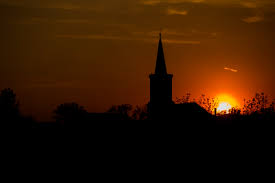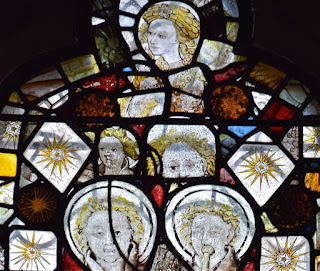"The golden evening brightens in the west": Hallowtide piety from poets in the Anglican tradition
Poetry is the person of faith's native language ... No other language could possibly begin to do justice to these inspiriting, daunting mysteries of reality itself - Mark Oakley, The Splash of Words: Believing in Poetry (2016).
What does it mean to celebrate All Saints' Day? What is the purpose of Cranmer's classic collect for the feast? Must Anglicans look elsewhere for a piety to draw out the riches of this feast?
Answers to these questions, we might propose, are to be found in the words of poets in the Anglican tradition. It is they who hold before us the "daunting mysteries of reality" embodied in our "one communion and fellowship" with the Saints in glory. It is they who explore what it is, in Cranmer's wonderful phrase, for us to be "knit together" with the Saints. And it is they who show us the rich fare to be enjoyed in the Anglican tradition.
So, as Hallowtide draws near, let us listen to poets in the Anglican tradition and share their joy in the Communion of Saints.
Donne's 'A Litanie', capturing the contrast between the Church Triumphant and the Church Militant, offers a quite beautiful metaphor for the unity of the "one communion and fellowship":
And whilst this universal quire,
That Church in triumph, this in warfare here,
Warm'd with one all-partaking fire
Of love ...
The Communion of Saints is for Donne, for the Anglican tradition, no cold, empty phrase, for in that "one communion and fellowship" we are "warm'd with ... fire". All Saints Day, then, is a celebration of the warmth and light given by that fire.
In this "universal quire", Donne points to the prayers of the Church Triumphant for the Church Militant. He is sure that the Prophets "in common pray for me"; of the Apostles, he says "May they pray still, and be heard. Such joyful affirmation of the prayers of the Saints is, however, qualified with moderation and reserve:
O Lord, deliver us
From trusting in those prayers, though pour'd out
thus.
Herbert echoes this in his 'Angels and Saints'. While the Saints - including the "Blessed Maid, And Mother of my God" - are not to be invoked, it is "Not out of envy or maliciousness" that "I forebear to crave your special aid" but because the Saints triumphant and the Church Militant are together oriented towards the One who "our King Whom we do all joyntly adore and praise". But this moderation and reserve does not obscure the glory made manifest in the Saints, as proclaimed by Herbert's opening words: "Oh glorious spirits".
If Thomas Ken's hymn for All Saints' Day opens as does Herbert's poem - "Spirits ever-bless'd. Of joys supernal now possess'd" - he goes on to invoke the same metaphor as Donne for the Communion of Saints:
In praise, as well as prayer. We all desire with you to share;
Your joys in blissful light To everlasting hymn excite; From you we borrow fire.
And to your pitch of hymn aspire.
This is what it means for us in the Church Militant to join "with Angels and Archangels and with all the company of heaven", to glimpse with them the Fire that is the Alpha and Omega of all that is.
The metaphor of fire can be interpreted in a homely fashion: the warmth and light that radiates from the hearth, with the Saints closest to it and the Church Militant entering into the room from the cold, dark evening. Christina Rossetti offers another homely vision in her 'All Saints':
Like innumerable bees
Swarming, humming
Where flowering trees
Many-tinted,
Many-scented,
All alike abound
With honey.
This is a delightfully rich metaphor: the Communion of Saints has the scent and taste of honey. As such, the Communion of Saints does not overwhelm us, is not a matter of 'shock and awe', but, rather, is the delight of the beatific vision, the true fulfilment of the longings of humanity and the whole created order.
It is with William Walsham How's 'For all the Saints' that Anglican poetry gives its most enduring and resonant expression of the Communion of Saints. Here it is definitively demonstrated that a rejection of the invocation of Saints is not an obstacle to a rich, joyous piety celebrating the "one communion and fellowship":
O blest communion, fellowship divine!
We feebly struggle, they in glory shine;
Yet all are one in Thee, for all are Thine.
Alleluia, Alleluia!
Mindful that the hymn is often an unchanging feature of Anglican services at All Saints-tide, for those of us in lands in which the festival is celebrated amidst the darker days of mid-Autumn, there is a particular resonance to the verses which reflect on evening and light:
The golden evening brightens in the west;
Soon, soon to faithful warriors comes their rest;
Sweet is the calm of paradise the blessed.
Alleluia, Alleluia!
But lo! there breaks a yet more glorious day;
The saints triumphant rise in bright array;
The King of glory passes on His way.
Alleluia, Alleluia!
These verses beautifully locate All Saints' Day in the darker Autumnal days, amidst late afternoon sunsets, and in a naturally liminal time of year. 'For all the Saints' therefore also captures the Autumnal theme that had been prominent in how Keble addressed the feast in The Christian Year:
Why blow'st thou not, thou wintry wind,
Now every leaf is brown and sere,
And idly droops, to thee resigned,
The fading chaplet of the year?
... How quiet shews the woodland scene!
Each flower and tree, its duty done,
Reposing in decay serene.
This reflects a piety and sensibility which John Hughes described as "characteristically Anglican", in which "nature is always already oriented towards supernatural grace", a piety also described by John Milbank as "sturdily incarnated in land [and] parish". Autumnal days, in other words, are signs of our need for, and the rich glory of, the Communion of Saints.
Appropriately this leads us to conclude with a fine contemporary expression of the Anglican poetic tradition. In his sonnet for 'All Saints', Malcolm Guite wonderfully captures the Autumnal context of the feast with his simple but deeply evocative statement "The dark is bright". And it is the darkness which allows us to see the "reflected light" shining brightly in the Saints: the darkness of waning days, of seasonal intimations of our own mortality, of the uneasiness which traditionally accompanies this liminal time of year.
He then goes on to provide a very powerful description of what it is for us to dwell in the Communion of Saints, for Christ "weaves them with us in the web of being". Web, of course, has a particular contemporary reference, but this "web" has a much more profound meaning for us, for it is in it that we experience what it is to abide in the reality of eternal (rather than virtual) Life and everlasting (rather than artificial) Light.
Across the centuries, poets in the Anglican tradition have given expression to a rich, evocative piety of the Communion of Saints. This is testimony to Anglicanism's ability to nurture and sustain a lively vision of the "the one communion and fellowship" that the Church Militant shares with "thy blessed Saints". In other words, such a lively piety is not dependent on a cult of the saints embracing invocation, relics, shrines, and numerous liturgical observances. What Robert Nelson in his A Companion to the Feasts and Fasts of the Church of England (1703) termed the "beauty and excellency" of the feasts of the Prayer Book Calendar, together with joining the praises of "the whole company of heaven" in the Sacrament, the Te Deum's daily rejoicing in the Saints, and the Creed's solemn affirmation of this article of the Faith ensured that Anglicanism's poetic tradition could give expression to a vibrant piety of the Communion of Saints.As Hallowtide approaches, may the words of that poetic tradition enrich our celebration of the festival, that, "knit together" with the "blessed Saints", we might rejoice in the vision glorious.





Hey Brian, many thanks for this article! I find it fascinating that, though invocation to saints was dissuaded by English divines that there are hymns addressing the saints directly, though specifically not asking them for help. I suppose these are in the company of Baxter’s Ye Holy Angels Bright, and the later Anglo-Catholic Ye Watchers and Ye Holy Ones? Is the primary issue asking the saints for aid or prayer, rather than addressing them? I know English divines we’re ambiguous as to whether the faithful departed could even hear our prayers, but I suppose, as the prayerbook says, one could exhort both the heavenly host and the “spirits and souls of the righteous” (song of the three young men) to glorify, bless and praise the Lord? I’m asking, genuinely curious as to how an old high churchman would view this. Thank you again, and thanks for your response!
ReplyDeleteMany thanks for you comment and question. Yes, the issue is invoking the prayers of the Saints because this obscures reliance on the mediation of Christ. In terms of addressing the departed Saints, we might wonder if - as in the Benedicite addressing all created things - it is metaphorical (although I do not subscribe to this).
DeleteFor those of us who do not think it is only metaphorical, it is urging the Saints to praise the Triune God who is Creator and Redeemer means that the entire Communion of Saints - the Church Militant and the Church Triumphant - is together centred upon God, rather than looking upon each other. As such it echoes the Sanctus in the Eucharist, in which we share in the praises of the whole company of heaven, facing with them towards the Source of all holiness.